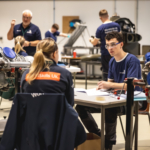We have a gap between young people and businesses which needs closing. Over many years, businesses have urged more action to help prepare young people for the work through improved careers advice and focus on improving attitude and employability skills. Such concerns were highlighted most recently in the CBI’s annual skills survey, which reported, for example, that four in five of its members (81%) are concerned about the careers advice young people are receiving and that more focus should be placed on improving awareness of work, self-management and communication and technology skills.
However, according to recent research by the Careers & Enterprise Company and WorldSkills UK, almost two-thirds (62%) of young people surveyed say they are prepared for work and they are developing the skills employers want. There is an apparent disconnect between the expectations of young people and those of employers. For many years employers have rightly set out clear expectations of their needs. What this research shows is that young people are trying to meet them – and believe that they are. Either young people are wasting time building skills of limited workplace value or employers do not appreciate the skills young people can bring. Whatever the case, the gap needs bridging
With growing skill gaps in key sectors, as well as gaps at technical level and higher level skills grades, a post-Brexit imperative to develop more home-grown skills, combined with the prospect of ever more apprentices entering the workplace, engaging young people to really understand their drives and motivations is vital. By doing so, we can identify disconnects and reframe the conversation, thereby potentially helping more employers succeed by becoming young-people ready.
When we compare the results of our survey of young people’s views with concerns raised by employers, three key disconnects emerge:
Firstly, young people say they are ready for work. Not only do they feel ready for work by age 18, but they have decided on a career by age 16. This reinforces the point that early engagement with young people is essential to help shape expectations both ways. Over three quarters of young people feel ready for work. Young women tend to prepare for work and deciding on the right career route, by seeking advice from someone in work, and visiting universities and colleges so they are making more informed choices. Young men also tend to seek advice from some in work, and do online research and visit a workplace. Yet many employers worry that young people aren’t properly prepared for the workplace, which is why so many are rightly stepping up to help fill the careers advice gaps they perceive.
Secondly, young people say they have the right skills. Young women, more than young men, feel they have the key soft skills that employers are looking for. Young women rate themselves more highly in terms of employability skills such as self-motivation, teamwork and communication. Young men rates themselves more highly in terms of possessing technology skills. Yet many businesses say they want to see more action to improve these exact same skills.
Thirdly, young people say they want stability. Perhaps surprisingly – given the changing nature of work, with self-employment rising and innovative forms of working creating a ‘gig economy’, as outlined in the Taylor Review – there is still a yearning amongst young people for a more stable career pathway. Almost four young people in five want career stability, with a third wanting a job for life in the same company, while 44% want to stay in the same career even if in different companies. Only a quarter are keen to have different roles in different companies and sectors over their career. Yet many businesses are seeking flexibility – not stability – to help cope with ongoing changes in the economy. As the recent CBI skills survey recognises, the pace and scale of change in the workplace can be unsettling and therefore it is essential that careers advice helps young people cope with change and thrive in dynamic innovative workplaces , which will be “essential for their future success”.
What our research points to is that we all – employers, educators and intermediaries – need to step up to the challenge of listening to and engaging more with young people, in order to create better mutual understanding of expectations and more productive and engaged young workforces. This could create not just an opportunity to improve outcomes on skills and careers advice, but also provide real benefits from a boost in workplace age diversity, if properly managed. And with the recent introduction of the Careers Strategy for England, we have a real chance to change the conversation between young people and employers.
We must therefore create more opportunities for business people and young people to engage with each other and overcome the disconnects. A good place to start is in existing work like The Careers & Enterprise Company continuing to expand its new opportunities for schools to take advantage of the support available from business, through the Company’s Enterprise Adviser Network. While at WorldSkills UK LIVE – formerly known as the Skills Show – , employers have the opportunity to reach tens of thousands of young people, as well as teachers, parents and careers guidance professionals. Hearing from young people directly is vital on issues such as careers advice through, for example, the Youth Summit held at The Skills Show in 2017.
Of course, we will all need to do much more to build further on existing business actions. But if we are all committed to listening more to young people, we can help address long standing challenges around careers advice and change the conversation about work readiness for good, to help more young people get a better start in work and life.
Read our five-point-plan approach to help employers place themselves in the best position to build the high-performing workforce of the future.


